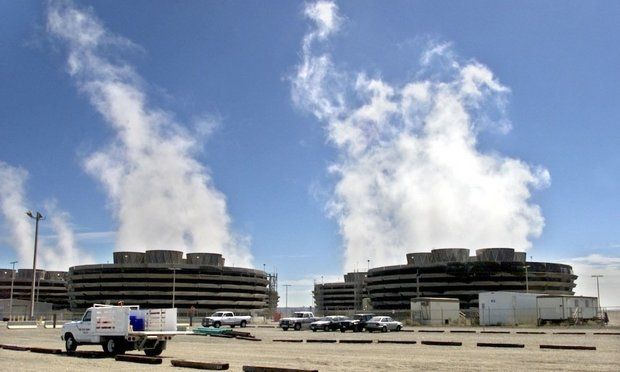forum
library
tutorial
contact

Closing Richland Nuclear Plant Would
Be a Win for Ratepayers, Study Says
by Ted Sickinger
The Oregonian, February 18, 2017
|
the film forum library tutorial contact |

|
Closing Richland Nuclear Plant Would
by Ted Sickinger
|
 Northwest ratepayers could save hundreds of millions of dollars over the next decade if the Bonneville Power Administration and Energy Northwest shuttered the region's only commercial nuclear power plant and replaced its electricity with renewable sources, a new study has found.
Northwest ratepayers could save hundreds of millions of dollars over the next decade if the Bonneville Power Administration and Energy Northwest shuttered the region's only commercial nuclear power plant and replaced its electricity with renewable sources, a new study has found.
McCullough Research, a Portland-based consulting firm, estimated savings from $261.2 million to $530.7 million over a 10-year span due to historically low prices for renewable energy.
"The rapid drop in renewable energy costs in recent years has been shocking to everyone," said economist Robert McCullough. "It is now possible to affordably replace aging facilities, like the 32-year old [Columbia Generating Station] ... without increasing the region's carbon footprint."
The report, commissioned by the anti-nuclear group Physicians for Social Responsibility, is the latest of a series to question the safety, reliability and economics of the aging plant just north of Richland, Washington.
The Columbia Generating Station is all that's left of a star-crossed plan to build five nuclear plants in the Northwest, a debacle that led to one of the largest municipal bond defaults in history. The Richland facility was the only one completed, and while it is an older design that has had a variety of operating issues, federal regulators recently cleared it to run through 2043.
The 1,200-megawatt nuclear plant is operated by a public utility consortium, Energy Northwest, and markets its power through the Bonneville Power Administration. Energy Northwest criticized the study's findings, saying the plant had set generating records in four of the past five years.
"It has never run better, and the report faults CGS for what makes it so valuable: We make electricity around-the-clock," said Mike Paoli, a spokesman for Energy Northwest. "With wind and solar, a lot of the generation happens at off-peak times. When peak demand comes, you have to have baseload generation to cover that." Baseload generation refers to a consistent source of power to meet minimum power requirements.
The study modeled the capital, operating and fueling costs of the nuclear unit, comparing them with replacement expenses from solar and wind energy. The cost of renewable energy generation has declined precipitously in the past decade, which has made it a more economic choice for utilities.
But supplying energy is different than assuring capacity - making sure power is available when you need it. Most experts note that the Northwest wholesale markets are awash in energy, but could soon go into a capacity deficit. Such a shortage could be exacerbated by the slated closure of three coal-fired plants in Oregon, Washington and Montana in 2020 and 2021.
Kieran Connolly, Bonneville's vice president for generation and asset management, said the agency is dependent on the nuclear plant when water conditions are low. He says some of the nuclear plants slated to close early, such as Diablo Canyon in California, were facing major new capital investments. That's not the case at Columbia Generating Station, he said.
"Our customers' focus is on safely, reliably and cost effectiveness" in meeting electricity needs, he said. "They're not seeing it as a resource they are questioning. They just want to make sure it's well managed."
The study made some significant assumptions: that Bonneville has enough spare capacity in its hydroelectric system to back up and integrate the massive volume of renewables that it would take to replace the nuclear plant; and that transmission is available to bring such renewable power to market.
McCullough acknowledged that either could be wrong, but said Bonneville should be testing the market to determine whether it can find economical, carbon-free replacement power.
"This is an old plant, and we're going to need to replace it," he said. "Are we going to do it in a timely and organized fashion? It's better to start that planning than do it all of a sudden after we discover an aging nuclear plant has sprung a leak."
learn more on topics covered in the film
see the video
read the script
learn the songs
discussion forum
